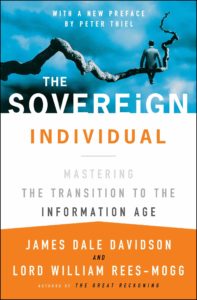
Check out the full notes for “The Sovereign Individual: How to Survive and Thrive during the Collapse of the Welfare State” by James Dale Davidson and Lord William Rees-Mogg
I’ve seen “The Sovereign Individual” mentioned here and there by crypto folks. Naval has a thread about it and the core argument around how violence shapes society.
“The coming transformation is both good news and bad. The good news is that the Information Revolution will liberate individuals as never before. For the first time, those who can educate and motivate themselves will be almost entirely free to invent their own work and realize the full benefits of their own productivity.” —
The Sovereign Individual: Mastering the Transition to the Information Age by James Dale Davidson, Lord William Rees-Mogg
I’m reading to understand whether my JPEGs will continue to have value or not.
One thing to mention as far as Web 3.0 goes: a bunch of people I follow who were fully involved in empowering others to educate themselves and invent their own work (let’s call that the creator economy) have transitioned almost entirely to building Web 3.0 things.
Teachers of cohort courses I joined last year now have web3 communities.
It’s a very small sample size, but just something I’ve noticed. Plenty of other course creators of courses I joined last year are still running newer versions of their courses.
I am still slacking off on the assignments.
The money-to-happiness engine
Equally, in the future, one of the milestones by which you measure your financial success will be not just now many zeroes you can add to your net worth, but whether you can structure your affairs in a way that enables you to realize full individual autonomy and independence. The more clever you are, the less propulsion you will require to achieve financial escape velocity.
I listened recently to a reunion of the Twitch Founders on Justin Kan’s YouTube channel.
First, this is just amazing that it’s available for free. I’d love to go back in time and tell the authors of The Sovereign Individual that you can go on the internet and watch the founders of a company that sold for a billion dollars talk about their early days starting the company from scratch, laying the foundation of streaming video on their platform. This would be free on a different streaming video site, where 9 figure individuals choose to create their own freely available video channels.
The authors might be distracted by the time machine.
But I could get their attention again by pointing out that the company in question sold to a trillion dollar book store.
===
Second, and the actual reason I bring that reunion convo up, is that Michael Seibel talks about money and happiness. They’re all Silicon Valleu successes, so they are and know many millionaires. Not all of those people are happy.
Seibel says it comes down to knowing how to convert money into happiness. The more efficient the better.
At peak efficiency, of course, you don’t actually need the money to realize happiness. Since enlightenment is a different kind of difficult, you can start by figuring out what makes you miserable and seeing if money can help in those areas. Then figure out what activities and people and whatever else make you happy. Then see if money can help you have more of those experiences.
If you’re sacrificing time that would otherwise go toward happy activities to try and make more money, your engine has some kinks in it. (Assuming a lack of money is not leading to misery, e.g. your rent is paid comfortably, etc.)